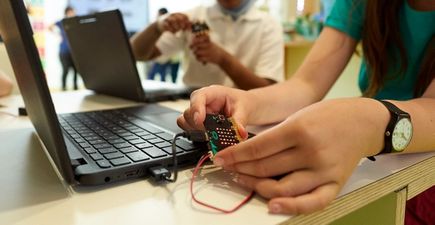WISE Program
The WISE programme (Women In STEM and Entrepreneurship) at Monash University, Victoria, offered girls at Year 10 in secondary school the opportunity to discover micro:bit and develop their skills in entrepreneurship.

The programme was developed in partnership with Monash Tech School, Victorian Space and Science Education Centre, Micro:bit Educational Foundation, Tech Girls Movement, Hacker Exchange and Monash Generator. The state-wide competition brought girls from over 100 secondary schools who were mentored by female technology students at Monash University, who worked with the teams as mentors.
Programme design
The programme was devised in three stages:
- Internet of Things workshop for all participating students
- Two day entrepreneurial workshop for 10 teams
- Two winning teams receive a trip to Silicon Valley
Up to 125 teams were invited to attend one of a series of one-day workshops held in May and June 2019 to learn about connected technology and the 'Internet of Things'. As part of this day-long workshop, students also developed programming skills by getting hands-on with the micro:bit and learned how to develop, plan and pitch an entrepreneurial idea or solution using the technology.
A selected group of 10 teams received additional entrepreneurship training to help further develop their ideas and pitch them before two winning teams were selected for a trip to the Silicon Valley-based Hacker Exchange for intensive training.
To help facilitate the workshops, all team members were required to complete 3-4 hours of pre-work prior to attending, which involved an introduction to micro:bit through a series of simple activities on Makecode.
Impact and results
- More than 250 year 10 female students took part
- 53 teams of 4 participated
- Each team developed and then pitched a unique concept and prototype
- Ideas and solutions involving micro:bit included moisture sensors for growing vegetables, apps to control and monitor heat and motion in cars, sensor mats for older people and a recycling sorter
Curriculum context
In Australia, digital skills, computing and computational thinking concepts are incorporated into the classroom as part of the Digital Technologies curriculum.
These concepts are first introduced in the Foundation (Kindergarten) year and are integrated in curriculum through to Year 10 (F-10). The subject matter comprises two related strands:
- "Knowledge and Understanding" which focuses on the information system, data, software, harware and networks
- "Processes and Production Skills" focusing on using digital systems to create ideas and information, defining, designing and implementing digital solutions
The Digital Technologies curriculum is implemented on a state-by-state basis throughout Australian schools.